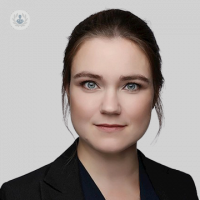Cataracts: what are they, what causes them, and how are they treated?
Autore:Cataracts are a common eye condition that affects aging eyes, resulting in a decrease in the quality of vision. Highly-experienced consultant vitreoretinal surgeon Ms Evgenia (Jen) Anikina who treats patients in London, Reading, and Windsor discusses the symptoms, early warning signs, and treatments for cataracts.

What are cataracts and how do they affect people's quality of life?
Cataracts occur when the natural lens of the eye becomes clouded.
The sort of symptoms people gets with cataracts vary quite widely; however, they commonly include glare from lights, e.g., during night driving, sensitivity to bright sunlight, vision blurring, a need for good illumination in order to read, changing glasses prescription, and reduced brightness of colours.
What are the first signs of having cataracts?
Glare and light sensitivity are frequently the first thing that people notice, as well as an increased need for good lighting indoors for close tasks. Sometimes, we can see very minor changes in a patient’s lens, and their vision is not significantly reduced, however they are experiencing a lot of quality issues with their vision.
Another thing people notice is the increasing need for reading glasses. Although this is not related to cataract development per se, it is another result of aging that changes the natural lens of the eye. Decreasing lens flexibility means that it is less able to change shape and focus at different distances as time goes on and help is required to be able to see clearly for close tasks.
What is the main cause of cataracts?
Although some people are born with cataracts or develop them as a result of injury, the most usual cause of cataracts is aging. Certain factors will accelerate the development of cataracts, such as over-exposure to UV light and diet or lifestyle factors. Other eye conditions or other health issues can lead to cataracts. It is believed that the use of good UV-blocking sunglasses in younger life can help delay and abate cataract formation.
What can happen if they go untreated?
In the developed world, it is unusual for cataracts to result in blindness, as treatment is usually sought at an earlier stage. Without good access to healthcare and especially in sunny climates, it is possible to lose most of your sight from cataract formation. In the UK, the most common result of delayed cataract treatment is a reduced quality of life, with difficulties reading, loss of the ability to drive, and reduced independence. In some cases, growing cataracts can result in increased eye pressure and the development of glaucoma. It also becomes more difficult for optometrists and ophthalmologists to assess the retina at the back of the eye, as the view through the cloudy cataractous lens worsens. This can adversely affect retinal screening, for instance for diabetic patients or those with other retinal conditions.
How are cataracts treated? Is it painful?
A cataract operation is a painless procedure that takes fifteen-to-twenty minutes on average. Drops, or occasionally an injection next to the eye are administered to numb the eye so no pain is felt. Keyhole surgical techniques and ultrasound energy are used to break up the cloudy cataractous lens inside the eye and a clear plastic lens is implanted in its place to focus the light. There is no requirement for inpatient hospital stay or a general anaesthetic. Your surgeon should discuss the choice of lens implant with you, to ensure that you know what to expect from your vision afterward. There are usually some drops to take for a few weeks after surgery, however normal life can resume more or less straight away after surgery.
After cataract treatment, do patients gain full vision again?
If no other eye conditions co-exist with the cataract, such as macular degeneration or other problems affecting the vision, normal vision is regained straight away. The eye usually takes between a few hours to a few days to gain its full visual potential, but complete recovery continues for about a month after surgery. You will need a check-up for glasses at the optometrist at this stage, as they are usually still needed, typically for reading. However, the type of glasses which may or may not be required will depend on the refractive outcome plan you made with your surgeon prior to the operation. Patients often report how much brighter the colours look and enjoy looking at the blue sky! Take note, they do sometimes notice the dust on the mantelpiece also, which they didn’t notice prior to surgery!
Ms Evgenia (Jen) Anikina is a leading consultant vitreoretinal surgeon who treats patients in London, Reading, and Windsor. If you would like to book a consultation with her to discuss treatment options for cataracts, you can do so by visiting her Top Doctors profile.


